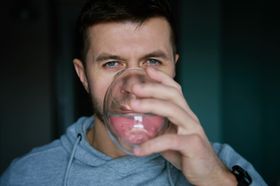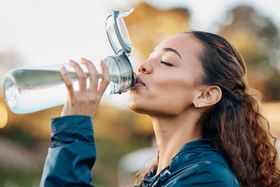How Electrolytes Fight Fatigue And Boost Your Energy Levels
Discover how electrolytes fight fatigue and unlock a more restful sleep—whether you're an endurance athlete or not.
Updated February 11, 2025

Ever feel inexplicably drained? That afternoon slump hits us harder than usual on some days.
The culprit could be an imbalance in essential minerals. These nutrients keep your body running optimally by balancing fluids, helping proper nerve and muscle function.
But how exactly do these electrolytes help with fatigue and boost our energy?
What Are Electrolytes?
Electrolytes are minerals that conduct electricity when they dissolve in water. These essential nutrients help regulate fluid balance, support nerve function, maintain pH levels, and enable muscle contractions.
Common electrolytes include:
- Sodium
- Potassium
- Calcium
- Magnesium
Do Electrolytes Help With Tiredness?
Electrolytes power you. They help keep your fluids balanced, send messages between your brain and body, maintain the pH level in your blood, and help your muscles move.
Here are some other ways they can contribute to your well-being:
- Energy Boost: Sodium keeps the right amount of water in your body. It also helps send messages throughout your body, telling muscles when to move. If you don't have enough sodium—hyponatremia—your muscles can get weak, making even simple things feel tiring. [1]
- Stress Reduction: Magnesium may calm your anxiety. It regulates the nervous system and promotes relaxation. [2] Chronic stress can also deplete magnesium stores in the body.
- Stronger Bones and Muscles: Calcium helps make bones strong, which is crucial for women who've gone through menopause and are at risk of weak bones. [3] Eating enough potassium can help prevent muscles from cramping.
Can You Have Too Many Electrolytes?
Too much sodium can dry you out and lead to a condition called hypernatremia. This can cause problems like muscle twitching, confusion, and even seizures in severe cases. It can also increase your risk of kidney stones and irregular heart rhythm. Be careful about how much sodium you eat, especially in processed and fast foods which often have a lot.
Electrolyte drinks and supplements can provide a boost, but they often contain excess sugar and salt. Mineral drops might be a better choice because you can decide exactly how much you need.
They can give you a good mix of important minerals like magnesium and potassium. They can help you feel less tired, sleep better, stay hydrated, and improve your overall health.
How Electrolyte Imbalance Causes Fatigue
Electrolyte imbalances can significantly impact your energy levels, leading to fatigue. Here's a deeper look at how they contribute to this:
Cellular Function
Sodium and potassium help move nutrients into and out of your cells, kind of like a busy post office. It's important to have the right amount of these helpers so everything runs smoothly.
It can mess up how your cells work if there aren't enough of these two minerals or if there are too many. This can cause problems for your body and might even affect how your cells make energy.
Hydration
Electrolytes balance water in your cells. When there's an imbalance, it can make you feel dehydrated, even if you've had enough water. But it's not just about dehydration.
They also help your muscles to work and your nerves to send messages. What does this mean? Electrolytes give you energy So, if they're out of balance, you might feel tired too.
Nutrient Absorption
Electrolytes also help your body digest food. If you don't have the right balance, your body might not be able to use the nutrients in your food as well as it should. This can make you feel tired, even if you're eating enough.
Hydrate Smart!
Even a little bit of dehydration can make you feel tired. It's not just about how much water you drink, but what kind of water you drink. If plain water isn't working, try other tricks to stay hydrated.
Electrolytes for a Peaceful Night's Rest
While low electrolytes can cause fatigue, a balanced intake can benefit sleep in a few key ways. Here's how:
- Muscle and Nervous System Relaxation: Your muscles need to relax before bed. Having enough magnesium and calcium can help stop cramps and restless legs, which can keep you awake. These minerals might also help you feel calm. By balancing them, you'll be more relaxed and fall asleep easier.
- Hydration: Sodium manages water in your body. It helps decide how much water stays inside and outside your cells. Basically, it's like a gatekeeper that controls the flow of water throughout your body.
- Hydration and Electrolytes: When sodium levels are just right, water can move freely around your body. But if you don't drink enough water, it might make it hard to sleep.
- Sleep Support: Calcium promotes REM sleep, helping your body to rest and recharge deeply. It can help without relying on stimulants, especially for people with insomnia.
Don’t Wait for Fatigue to Manage Electrolytes
While tiredness is a common symptom, an electrolyte deficiency can also manifest in headaches, muscle cramps, nausea, vomiting, confusion, and irritability. Individuals who sweat heavily, engage in intense physical activity, or adhere to restrictive diets are at increased risk.
If you experience persistent symptoms, consult a healthcare professional to evaluate your electrolyte levels and recommend appropriate steps.
References:
- H. Rondon and M. Badireddy, “Hyponatremia,” StatPearls - NCBI Bookshelf, Jun. 14, 2023. Available: https://www.ncbi.nlm.nih.gov/books/NBK470386/
- A. Botturi, V. Ciappolino, G. Delvecchio, A. Boscutti, B. Viscardi, and P. Brambilla, “The Role and the Effect of Magnesium in Mental Disorders: a Systematic review,” Nutrients, vol. 12, no. 6, p. 1661, Jun. 2020, doi: 10.3390/nu12061661. Available: https://www.ncbi.nlm.nih.gov/pmc/articles/PMC7352515/
- N. S. C. and O. Branch, “Calcium and vitamin D: important for bone health,” National Institute of Arthritis and Musculoskeletal and Skin Diseases, Aug. 04, 2023. Available: https://www.niams.nih.gov/health-topics/calcium-and-vitamin-d-important-bone-health
Do electrolytes help with sleepiness?
Electrolytes indirectly aid sleep by supporting hydration and overall bodily function. Certain electrolytes like magnesium may promote relaxation. They aren't a direct sleep aid.
What can I drink for fatigue?
Water is essential. Consider electrolyte-rich drinks for replenishment. Avoid excessive caffeine or sugary beverages. If fatigue persists, consult a healthcare professional.
What vitamins am I lacking if I'm always tired?
Common culprits include iron, vitamin B12, vitamin D, and B vitamins (B2, B3, B5, B6). Persistent fatigue warrants a medical checkup.
Is it OK to drink electrolytes every morning?
Generally safe for most, but unnecessary unless you're highly active, in a hot climate, or experiencing electrolyte loss. Prioritize water intake and consult a doctor for persistent concerns.
What is the best time to take electrolytes?
Optimal timing depends on individual needs. Generally, consume before, during, or after intense exercise, in hot weather, or when experiencing dehydration. Evenings can help prevent nighttime dehydration.
Disclaimer: The information published by Mayu Water is not a substitute for the expert knowledge, advice, and recommendations of trained professionals. We strongly recommend consulting with industry experts and primary or scientific sources before making any health, research-related, or other important decisions.













































